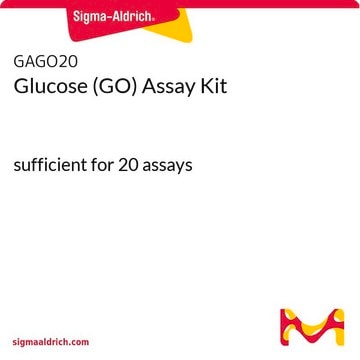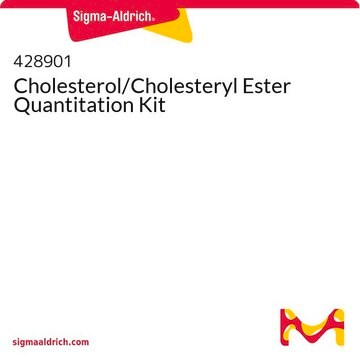MAK266
Triglyceride Quantification Colorimetric/Fluorometric Kit
sufficient for 100 colorimetric or fluorometric tests
Synonym(s):
TG Quantification Kit
Sign Into View Organizational & Contract Pricing
All Photos(1)
About This Item
UNSPSC Code:
12161503
NACRES:
NA.84
Recommended Products
detection method
colorimetric
fluorometric
relevant disease(s)
neurological disorders; cardiovascular diseases
storage temp.
−20°C
General description
The new Triglyceride Quantification Kit, MAK564, is now available! Triglycerides (TG) are the main constituents of vegetable oil, animal fat, LDL and VLDL, and play an important role as transporters of fatty acids as well as an energy source. TG is broken down into fatty acids and glycerol, after which both can serve as substrates for energy producing and metabolic pathways. High blood levels of TG are implicated in atherosclerosis, heart disease and stroke as well as in pancreatitis.
Suitability
Suitable for use with serum, plasma, and other biological fluids, and tissue and cell culture samples.
Principle
The Triglyceride Quantification Kit provides a sensitive, easy assay to measure TG concentration in a variety of samples. In this assay, TG are converted to free fatty acids and glycerol. The glycerol is then oxidized to generate a colorimetric (570 nm)/fluorometric (lex = 535 nm/lem = 587 nm) product. The kit is sensitive to detect 2 pmole–10 nmole (2–10,000 mM range) of triglyceride in various samples. The kit also detects monoglycerides and diglycerides.
Signal Word
Danger
Hazard Statements
Precautionary Statements
Hazard Classifications
Resp. Sens. 1 - Skin Sens. 1
Storage Class Code
10 - Combustible liquids
Flash Point(F)
188.6 °F - closed cup
Flash Point(C)
87 °C - closed cup
Certificates of Analysis (COA)
Search for Certificates of Analysis (COA) by entering the products Lot/Batch Number. Lot and Batch Numbers can be found on a product’s label following the words ‘Lot’ or ‘Batch’.
Already Own This Product?
Find documentation for the products that you have recently purchased in the Document Library.
Customers Also Viewed
L Vogel et al.
Journal of dairy science, 103(8), 7431-7450 (2020-06-02)
Rations including high amounts of corn silage are currently very common in dairy production. Diets with corn silage as forage source result in a low supply of essential fatty acids, such as α-linolenic acid, and may lead to low conjugated
Pingping Luo et al.
Acta pharmaceutica Sinica. B, 11(3), 668-679 (2021-03-30)
Alcoholic liver disease (ALD) causes insulin resistance, lipid metabolism dysfunction, and inflammation. We investigated the protective effects and direct regulating target of S-allylmercaptocysteine (SAMC) from aged garlic on liver cell injury. A chronic ethanol-fed ALD in vivo model (the NIAAA model)
Glyceroneogenesis and the triglyceride/fatty acid cycle.
Reshef L, et al.
The Journal of Biological Chemistry, 278(33), 30413-30416 (2003)
David A. Wilson
Clinical Veterinary Advisor: The Horse (2011)
Clinical biochemistry and hematology.
The laboratory rabbit, guinea pig, hamster, and other rodents., 57-116 (2012)
Our team of scientists has experience in all areas of research including Life Science, Material Science, Chemical Synthesis, Chromatography, Analytical and many others.
Contact Technical Service




